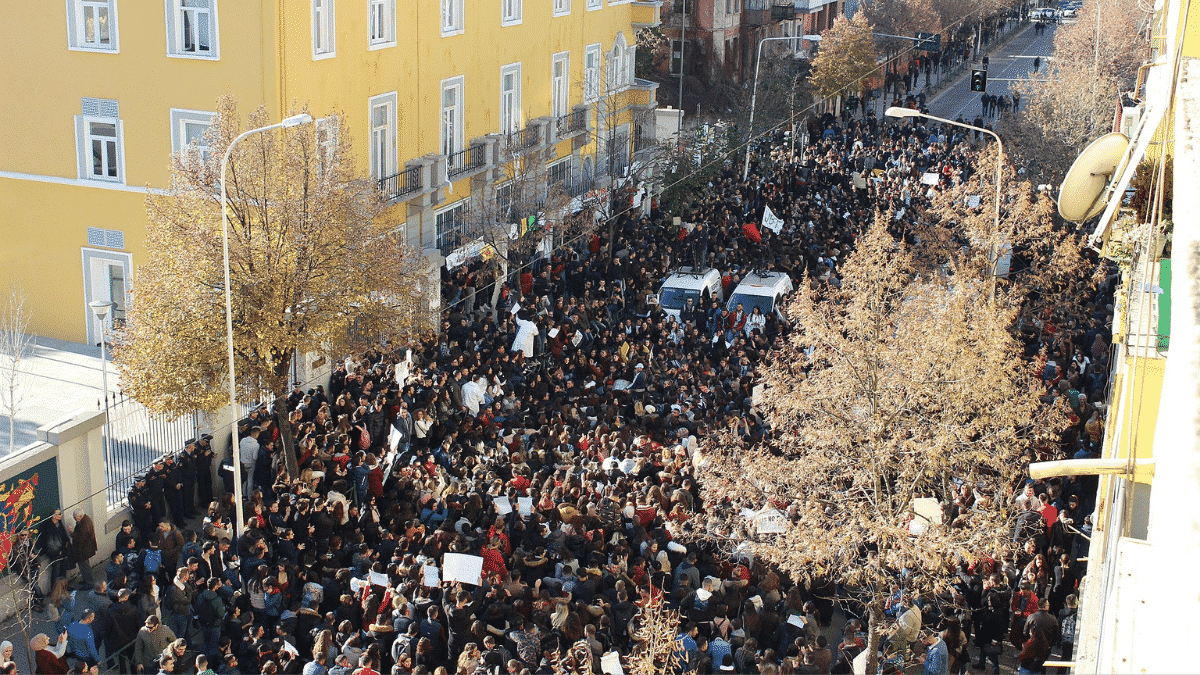The Ongoing Albanian Plagiarism Crisis

On September 15, Albanian Prime Minister Edi Rama announced Member of Parliament (MP) Evis Kushi would be the new Minister of Education, Sports and Youth for his cabinet.
Kushi replaces outgoing minister, Besa Shahini, who left the post citing “family reasons.”
However, almost immediately after her nomination, Kushi became the source of controversy as students noticed what they claimed was significant plagiarism in scientific articles published by her. According to reports, one of those articles contains up to 90 percent plagiarized material.
Students then began to protest her nomination, demanding that she use the same software purchased by the Ministry of Education to check her own work. Kushi has not responded to the allegations and the government has not issued a statement.
However, it’s important to put this story in its proper context. Kushi is not just a high-ranking politician accused of plagiarism, she is actually the latest chapter in a long-running saga involving student discontent and plagiarism by government officials.
To understand better, we have to go back a few years to December 2018, when much of the controversy actually started.
Student Protests, Allegations of Plagiarism

In late 2018, the Albanian government announced that that it was raising the cost of tuition at Albanian schools and instituting new fees on exams. This came atop already rising fees and deep concerns about the quality of education within the country.
Beginning on December 4, 2018, students began to actively protest the new policies, taking to the streets en masse in a protest that became known as the Second Students Movement in Albania. The protests climaxed in January with students boycotting schools and eventually occupying university buildings. This lead to physical confrontations between students and police when police worked to retake the buildings.
However, as the protests were taking center stage, so did allegations of plagiarism by many high-ranking government officials. The allegations were first brought to public attention in October by Taulant Muka, an epidemiologist educated in the Netherlands. However, the allegations took on a new life during the student protests.
Ultimately, some seven high-ranking politicians faced serious allegations of plagiarism including the Minister of Health and Social Protection, a Deputy Minister of Education, three MPs and the director of the National Information Society Agency.
The protests did yield fruits. The government reshuffled its cabinet and the latest laws raising costs were annulled. Other improvements were also made but many of the requests of students went unanswered, even as protests died down in February.
Among the unfulfilled desires was any punishment taken against the plagiarizing government officials. Of the seven only one, the Deputy Minister of Education, resigned his post.
To that end, the appointment of Kushi seems like a reopening of old wounds. It is little wonder that students are once again protesting. However, it seems likely that such efforts are futile. After all, if there’s one thing that the Albanian government has shown, is that plagiarism does not have consequences for its politicians.
How the Tables Have Turned
What is unusual about this situation is that it is students working to hold their politicians (and in some cases their instructors) accountable for plagiarism. It’s a Bizarro World-like situation where students are accusers and not the accused.
The issue, according to reports, is a fundamental problem with the Albanian education system. That system includes an “extensive” market in purchased PhDs. Such packages often include custom dissertations penned by paid ghostwriters. It’s those ghostwriters that commit the original plagiarism, copying and pasting liberally to quickly complete assignments, then giving it to the buyer for them to pass off as their own.
It’s also a current problem. Two of the seven individuals involved in the original scandal received their doctorates in 2015, while they both were in office. This isn’t simply an issue of degrees that were issued decades ago having newly-discovered issues.
The students realize this and understand that the value of their degrees, which they are working hard to earn, hinges on the reputation of their school and their country’s education system. A reputation for fake PhDs and lax plagiarism enforcement harms those that are actually trying to earn their degrees.
To that end, the government and schools are trying to improve things. In 2018 a new anti-plagiarism system named Akademia was introduced and it represents the first such system for the Albanian language. Universities in the region have been adopting it up ever since.
But, while current students face scrutiny for plagiarism, that same scrutiny doesn’t isn’t applied to those that already received their degrees. As so many government officials are credibly accused of plagiarism, they face no consequences for their previous actions.
That creates a double standard which, predictably, has angered many students. Unfortunately, that crisis is likely to continue as there are almost certainly many more politicians and academics similarly-impacted and there seems to be no process for handling such cases as they arise.
If students are going to be held to a higher standard than the government and their educators, it stands to reason the protests and concerns will continue for quite some time.
Bottom Line
All of this plays back to an age-old question: How do you handle cases of plagiarism that happened years ago?
Obviously, the best time to catch plagiarism is immediately and before it’s published. It’s much easier to enforce rules before you’ve given someone their degree or published whatever they plagiarized.
However, even the best systems are going to miss cases and there still needs to be a plan for what to do when cases fall through the cracks.
In Albania, however, there doesn’t appear to be one. With plagiarism allegations made but no actual response from either the schools or the government. There’s no real investigation and no response from the government at all. The issue seems to simply be ignored.
However, doing that while putting greater pressure on current students isn’t just unfair, it’s counter to the reason you check for plagiarism in the first place. If you want to ensure that your degrees mean something, letting high-profile cases such as these go without response kills any positive reputation you may hope to grow by enforcing the rules more strictly today.
At the end of the day, academic integrity is about ensuring fairness and that the student meets the qualifications for the degree they have. Neither is achieved by ignoring plagiarism by graduates, especially recent ones.
If the Albanian government wants to improve its reputation in this area and convince their students that plagiarism is an important issue, they need to start by cleaning their own house. It’s that simple.
Header Image Credit: Kristina Millona / CC BY-SA
Want to Reuse or Republish this Content?
If you want to feature this article in your site, classroom or elsewhere, just let us know! We usually grant permission within 24 hours.
